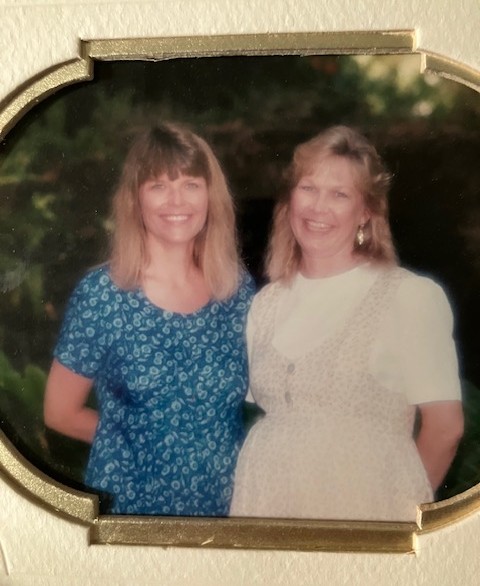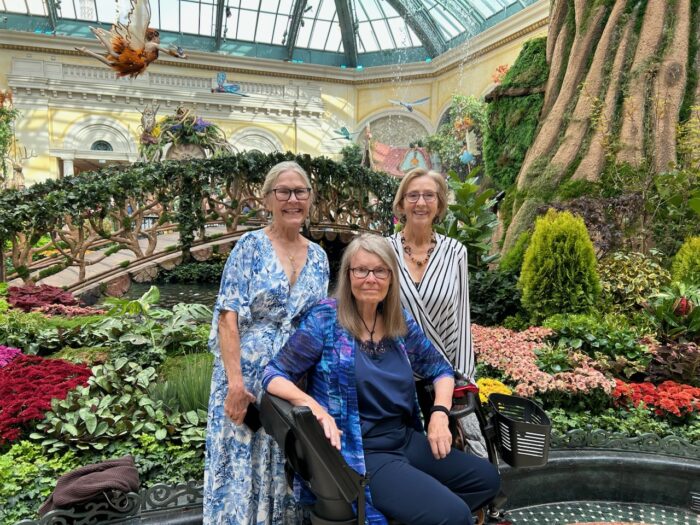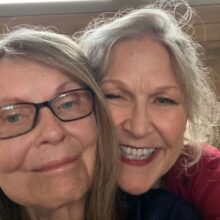November is National Family Caregivers Month, a time dedicated to recognizing and honoring the millions of Americans who provide essential care for loved ones. TMA recognizes with gratitude these generous individuals who may be family by birth or family by choice, as this story describes.
There’s not much to laugh about in the day-to-day challenges of inclusion body myositis (IBM), but somehow Rena Hayami and Rhonda Rogers have managed to face the reality of Rhonda’s disease with humor and grace. Along with Nancy Harber, the co-leader of TMA’s Southern California Myositis Support Group, Rhonda was this year’s recipient of TMA’s Marianne Moyer Myositis Leader Award.
Rhonda and Rena have a unique care partner arrangement: they live two hours away from each other in California. Nevertheless, they’ve maintained a close and mutually supportive relationship that’s endured for 51 years. The two women will be familiar to many TMA members from past MyoCons. Rhonda’s the beloved “Myositis Warrior,” and Rena is the friend who helps her navigate the crowds, enjoy conference meals, and manage the travel to and from the conference locations.

Their friendship didn’t begin as care partners. Rhonda and Rena met as freshmen at the University of Southern California and immediately formed a bond. “In fact, she was the first friend I made there.” Rena says. Both played the saxophone, both joined the same band squad, and both made a commitment to stay in touch no matter where life’s journey took them. There’s another, less tangible bond: One of their shared traits is the love of a good joke and a humorous way to approach a difficult subject.
They graduated, moved on, and found jobs. Early in her career, Rhonda was a broadcast journalist (Rena became a CPA) and traveled wherever her sense of adventure and job opportunities took her. “When Rhonda was working as a broadcast journalist in Butte, Montana,” Rena recalled, “she sent out a Christmas card with a photo of her in a sundress, enjoying a cocktail in the snow.”
They quickly formed traditions that brought them together. The two young musicians shared a love for the Eagles, and over the years they regularly met at concerts in Las Vegas, no matter where they lived or what their jobs were. “I think we’ve done that at least five times.” Rena says. A third college friend, Carolyn Rusch, joins them and has also continued to support Rhonda.

Even when meeting only a handful of times each year, the women kept each other informed about their lives. Undiagnosed and misdiagnosed for a number of years, Rhonda let Rena know about her growing weakness. “Of course, when we met, I could see for myself,” Rena says. “One good thing about the slow progression of Rhonda’s disease is that she’s had time to plan carefully for her future.”
The friends have more than music in common: both faced their lives with a desire to find humor and creativity in their day-to-day existence. Rena was there at the birth of the “Myositis Warrior,” with suggestions and physical assistance in creating Rhonda’s costume for Comicon in San Diego, making sure that the collaborative design would be one that Rhonda could manage by herself.
MyoCon offers enormous benefits for patients, but also a number of challenges. Some of the challenges are clearly physical, and Rena has had experience in insisting on appropriate accommodations for her friend when the hotel has overlooked them. Rhonda refers to her as “my sherpa” because of her help in carrying suitcases and supplies. Because of their long friendship and Rena’s deep understanding of Rhonda’s needs, she also spies less obvious ways that her friend might need help. And she understands that Rhonda is likely to be sunny and optimistic, no matter her circumstances. “She just doesn’t see that there’s anything to be gained by a sour attitude.”
“Because Rhonda’s so much fun, she’s surrounded by people at the conferences,” Rena says. “I remind her that she needs to rest or needs to stop and eat.” It seems natural to her to cut Rhonda’s food or to pour water for her.
“One thing that not everyone understands is that it’s hard for us to ask for help. I recommend that all care partners discuss this, especially as things change.” — Rhonda Rogers
“She knows me so well,” Rhonda says. She’s well aware that “things are lopsided in our relationship,” but she tries to accept help graciously and express appreciation for her friend’s thoughtful companionship at MyoCon and other events. Rena loves doing it, not only to be helpful but because she enjoys it, Rhonda says. “We always manage to have fun.”
Resources for care partners:
